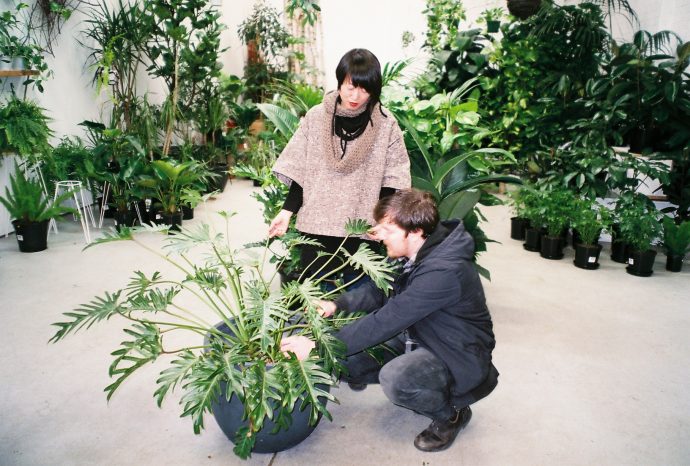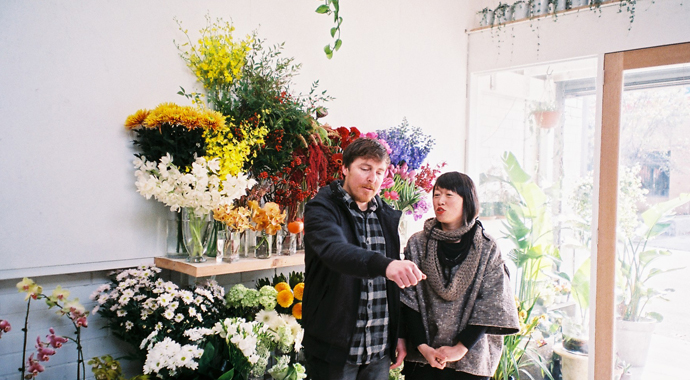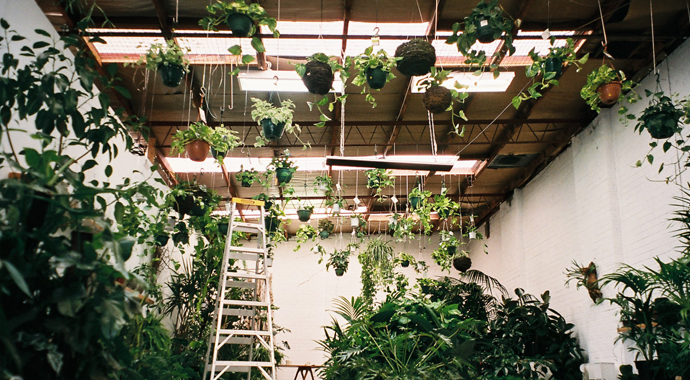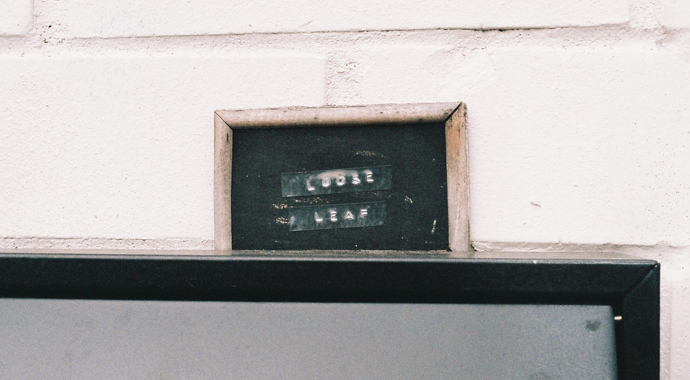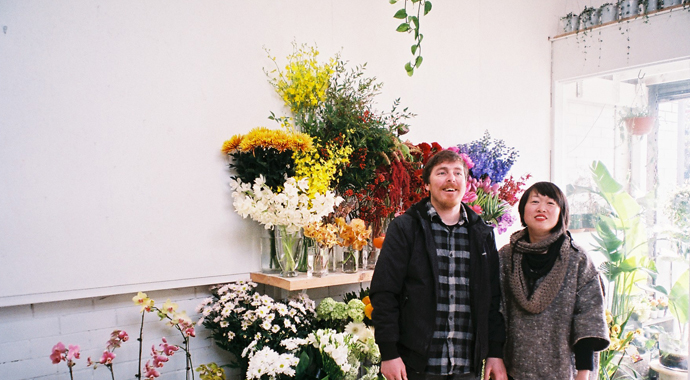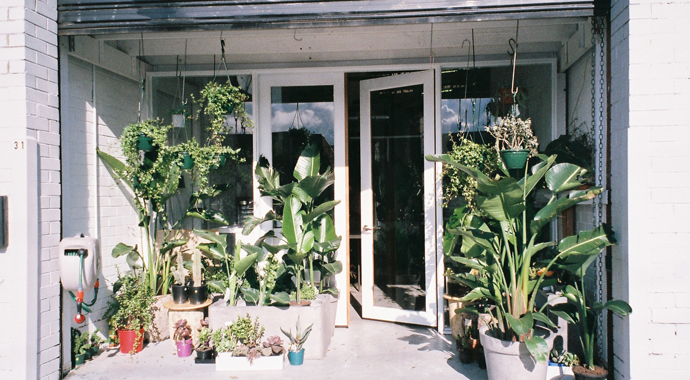Loose Leaf shows how to adapt and evolve
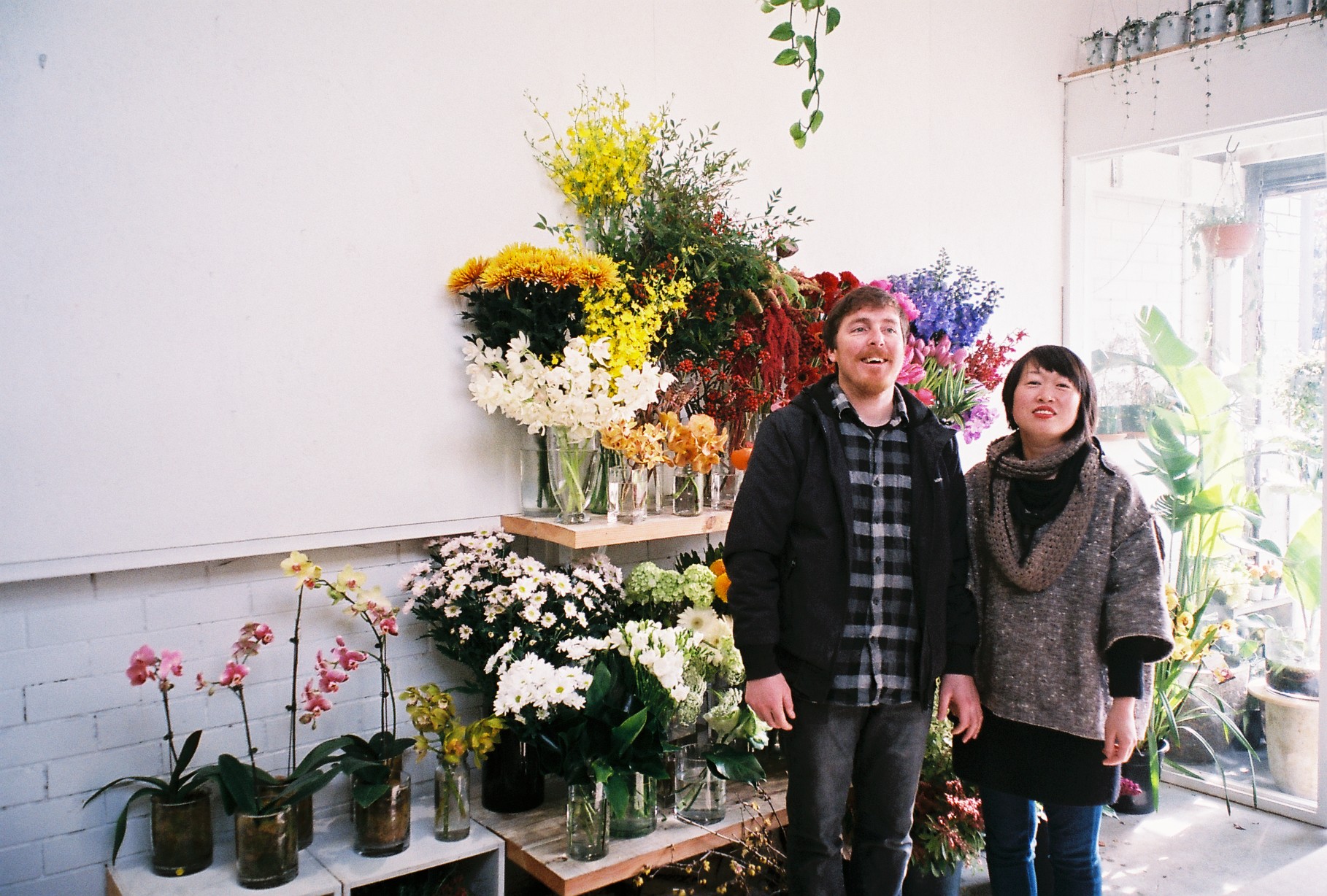
Nestled in the back streets of Collingwood, Melbourne, is Loose Leaf, a one-of-a-kind space dedicated to flora. Owners Charlie Lawler and Wona Bae take inspiration from permaculture practices and continue to evolve their business accordingly. The space itself acts as a plant store, florist and studio and is the temporary home to a selection of exquisite plants and seasonal flowers. Loose Leaf is a serene escape from the grey surrounds of the wintry city. Anna Hickey speaks to Charlie, one half of Loose Leaf, about his prosperous and evolving creative business.
Loose Leaf is a business intrinsically built on the principles of permaculture. Partners and flora visionaries Charlie Lawler and Wona Bae launched the multifaceted space that champions the beauty of nature in 2014 and all has blossomed since. Walking into the shop, visitors are welcomed by a sanctuary of carefully selected exotic plants and are warmed by the light-filled, white walls and double height ceilings – a green inner city sanctuary. The interior is minimal – think white cube exhibition space. Signage is limited, creating ample opportunities for conversation with Charlie and Wona on all things botany.
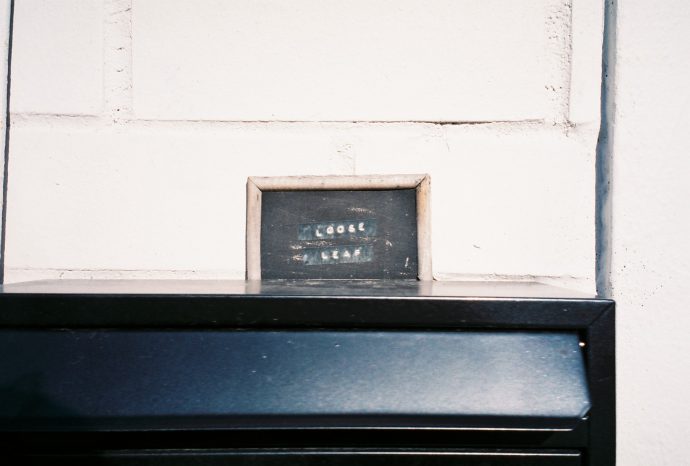
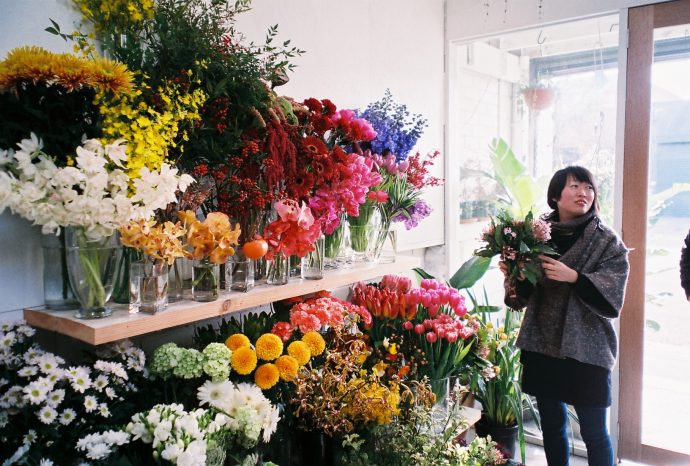
Permaculture is a contracted form of ‘Permanent Agriculture’, a term that was coined in the mid 1970s by Australian academic/environmental designer duo Bill Mollison and David Holmgren. The practice of permaculture draws from, and mimics the patterns, features and cycles of natural ecosystems. Being true to core permacultural ideals – of working with nature rather than against – Charlie and Wona have created an adaptable space that, at any one time, can be used as a plant store, florist, sculptural studio, classroom and (sometimes) gallery. Locals even visit during winter and sit amongst the greenery while they eat lunch, highlighting the informal role that Loose Leaf plays in community-building.
Loose Leaf is Charlie and Wona’s first business together, but it is certainly not the first time that they have worked in partnership to inspire others through nature. Having cumulative experience in design, art, permaculture, floristry and horticulture, this foray seemed like the perfect opportunity to combine their skills while reconnecting city-dwellers with the health and aesthetic benefits of integrating greenery into the home. I sat down with Charlie over a cup of coffee in his and Wona’s leafy office, where he spoke about the inspiration behind the flourishing business; Loose Leaf’s ongoing commitment to build more permaculture principles into all that they do; and their hopes for the future.
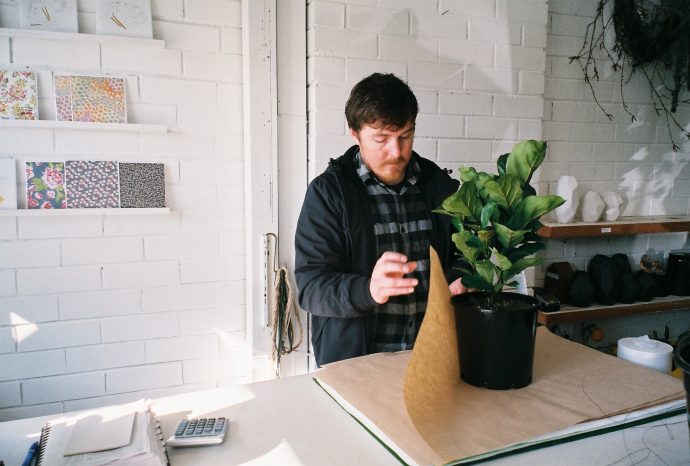
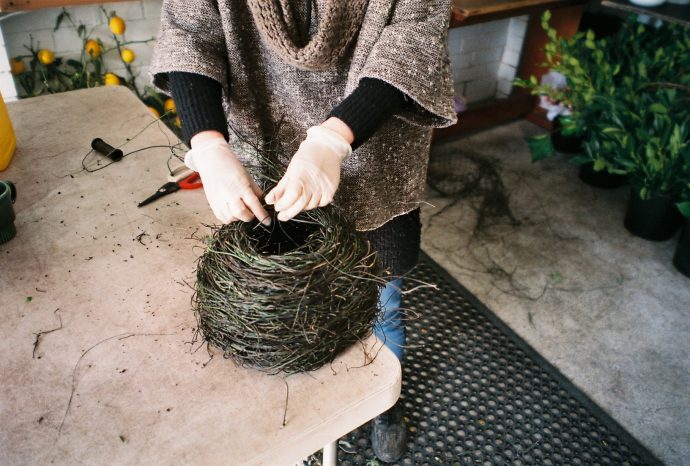
Anna Hickey
Was there a particular moment that inspired you to start Loose Leaf?
Charlie Lawler
Wona and I were both working in jobs for other people when we decided to start Loose Leaf. The drive for change came from a desire to step away from a ‘9-5’ working regime and the opportunity to work for ourselves: a classic intro into small business. And there was a particular ‘click’ moment. We bought a house on a whim and lived there for a few years with a mortgage. After some time paying off the mortgage, we looked at our lives and thought, ‘this doesn’t suit us at all’. We enjoyed our living space, but home ownership was never a dream for us as a couple. We realised that if we sold our house, we could finance our real dream – Loose Leaf. So we thought, ‘let’s do it’. Everything moved pretty quickly after that.
AH Is Loose Leaf an assemblage of both your backgrounds?
CL Very much so. We have been together for 10 years and Loose Leaf is the result of what we have been doing informally since the beginning of our relationship. For example, when we met in Germany I started helping Wona out with her floral exhibitions (something I do for Loose Leaf too!). In addition, my background is design and communication design, then permaculture design. Wona’s background is in floristry, horticulture and fine art through floral sculpture. Our skills mash together. Our personal motto under this space is to allow ourselves to be creative with nature and hopefully make a living along the way.
AH How does Loose Leaf fit into the cultural sphere of Melbourne?
CL Melbourne has a diverse cultural scene – it’s truly amazing. You can give any business or creative idea a go here and people tend to respond well most of the time. In our case, people have responded really well! In fact, we have been overwhelmed by how much people have liked what we are doing and encouraged us. We never imagined that we would receive so much support.
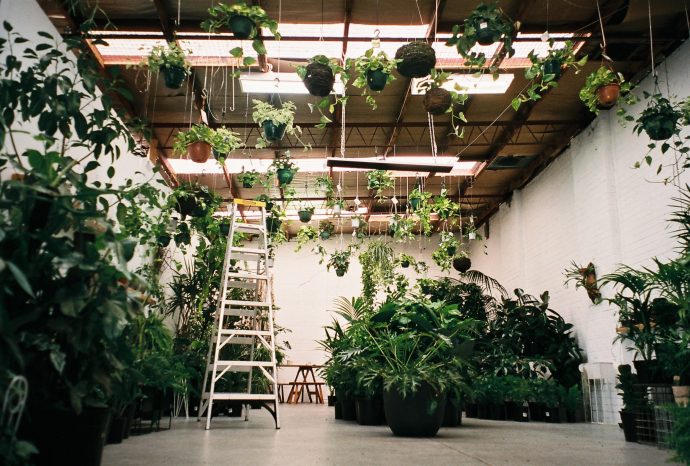
AH How did you conceptualise the design and functionality of Loose Leaf as a space?
CL Functionality forms the essence of this space. We wanted an area that was big enough to house a studio and retail space, something quite versatile. We needed a large area for creating in the studio and then depending on bigger jobs (we do a lot of fit-outs), the space to make larger scale things. Our idea was to put everything on wheels – to give us the freedom to easily change the layout. Wona wanted to be able to teach classes in here, so having the ability to create space for lessons was an important consideration in our design.
Overall, the current design is all about having agility to adapt to our multifaceted business needs. A lot of regular customers note how the space seems to change every week – and it really does. One day Loose Leaf is a classroom, the next it’s a studio, then it’s back to being a retail space, then it’s a gallery. It needs to change on a dime (although it doesn’t really end up being a quick change, as it takes 4-5 hours to flip everything around).
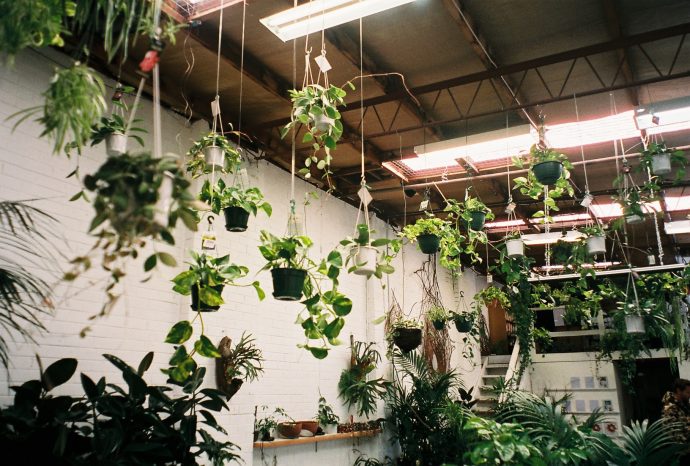
AH Who designed the space?
CL It took us a couple of years to find the right space – we were very picky about the location and feel. We designed it all ourselves, and Wona and I were resourceful. I had to build my desk into a plant hanging rack, otherwise there wouldn’t have been space for it. But, it fits nicely in our office. Structurally, we were able to keep things in order while keeping a blank canvas to ‘hero’ the plants.
AH Do you think that permaculture is intrinsically built into the business?
CL I think yes, especially our approach to renovating the space: we hardly bought anything, if we pulled out any wood we re-used it. We try to be resourceful and ethical in the way we do business too. There are dilemmas that we want to start addressing more. You pull off quite a lot of green waste with flowers and the flower industry uses a lot of chemicals, which makes it tricky to compost the waste. At the moment, we create compost to put in the non-edible parts of our garden. However we would like to find a solution to close the loop and have less waste.
We buy local and seasonal plants and flowers. We have farmers that come by once a week or once a month and drop off flowers to us. They open up their trunk and say “this is what I have got this week” – we really enjoy their visits. We are trying to get to know other growers around town too. Once or twice a week, I am out and about visiting growers and farmers for plants. We try to really get to know who we are buying our plants from. It takes a lot of time but I don’t know how else we could do it. I really like having that connection. Farmers carry so much knowledge and can educate you on their plants. For example, how they will respond at different time of the year. Also, my grandparents had a nursery and a farm and I spent a lot of time with them as a kid. So it’s really nice to go back to visit farms – it feels like being back with my grandparents. I think for Wona it is similar, she grew up on a flower farm in South Korea. Her father was growing flowers and is only going into retirement now.
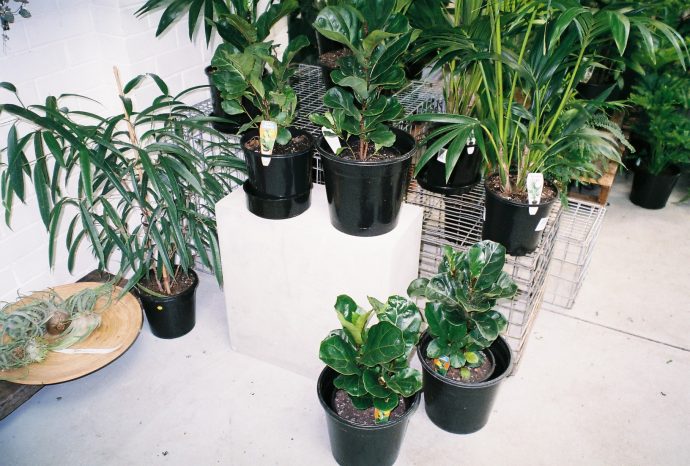
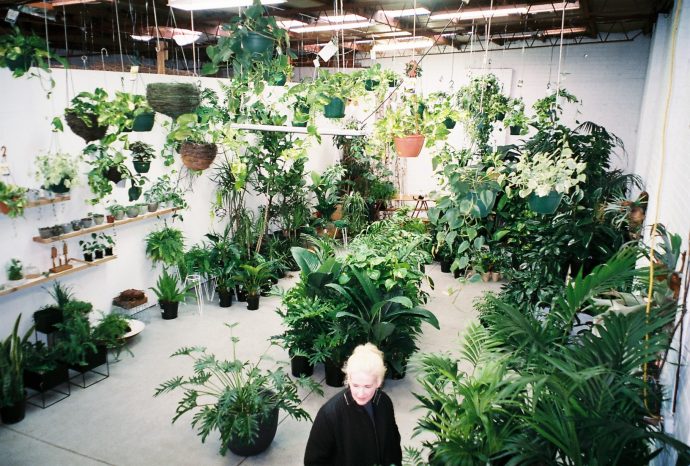
AH Why have indoor plants become popular again?
CL As much as it pains me to say it, there is certainly an element of trend with the current popularity of indoor plants. I do however feel that there is a bigger movement (and there has been for quite a few years) of people being more curious about where things come from and how they grow. I feel that there is a revolt against mass-manufacturing. People want to go back to the artisanal, the handmade and find out a little more about where things come from. As part of this, people are starting to explore nature a bit more again. I only hope that this continues. From a permaculture perspective I hope that houseplants become integrated into the architecture of homes more and more and are used to better people’s lives. There are so many opportunities to grow your own food in and around your house. People are also starting to realised that they can use plants to screen things, conserve energy, in therapy and to clean the air (to name just a few…).
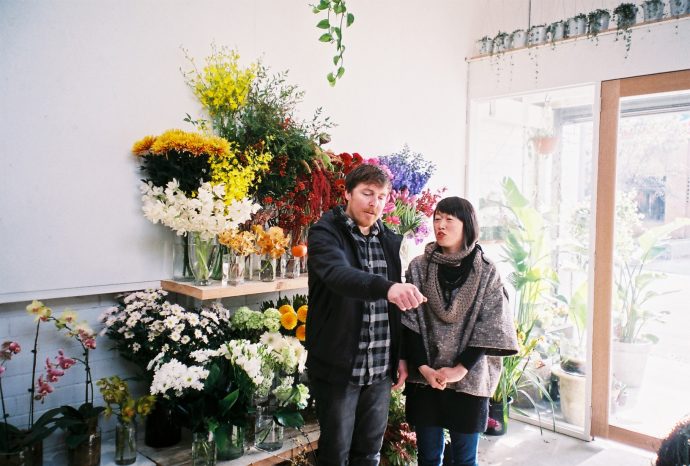
AH What are your hopes for Loose Leaf?
CL We are finding some time now to do design work, which we have been wanting to do for the last year. We also have big art based projects that we would like to execute this year. We would like to make some more botanical products, that relate to what we do. Create products especially for Loose Leaf that bring in permaculture principles – something we really value.
Thank you to Charlie and Wona for the low down on their green dream business. For info and upcoming events and workshops, visit looseleafstore.com.au, or head to 31 Sackville St, Collingwood VIC 3066.
